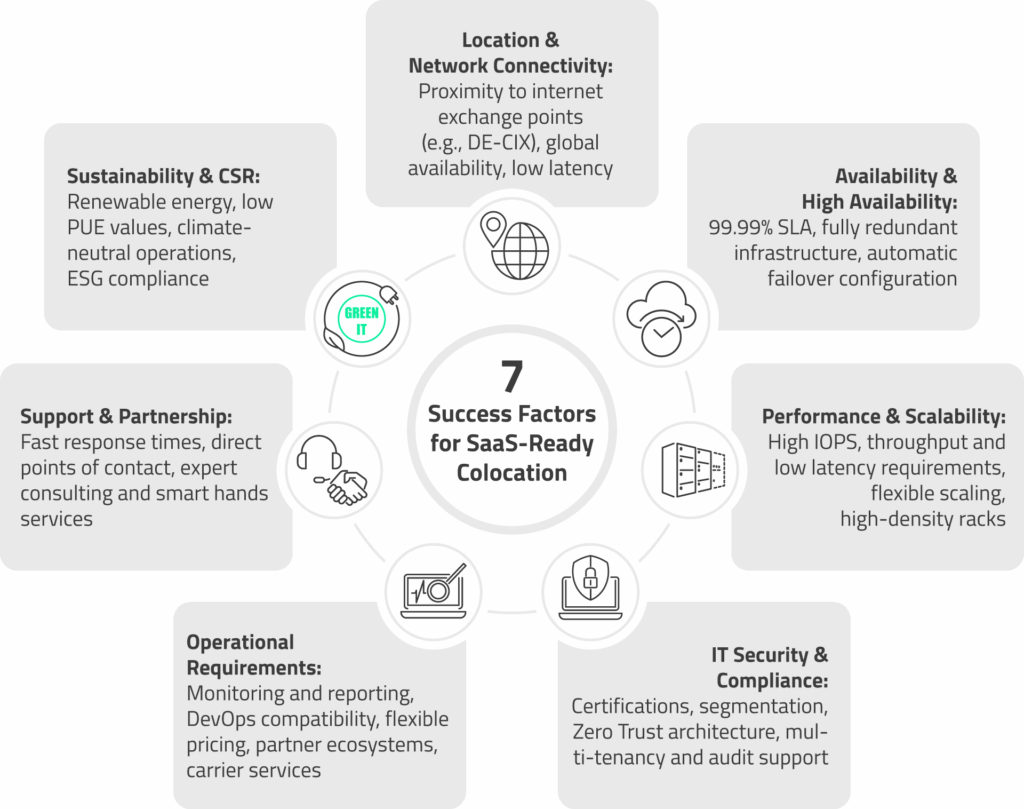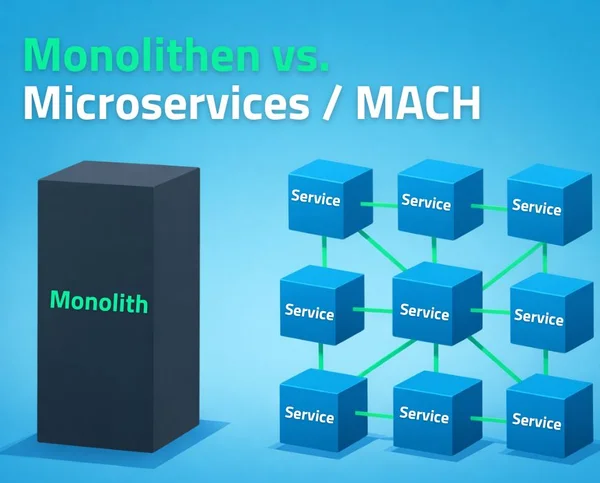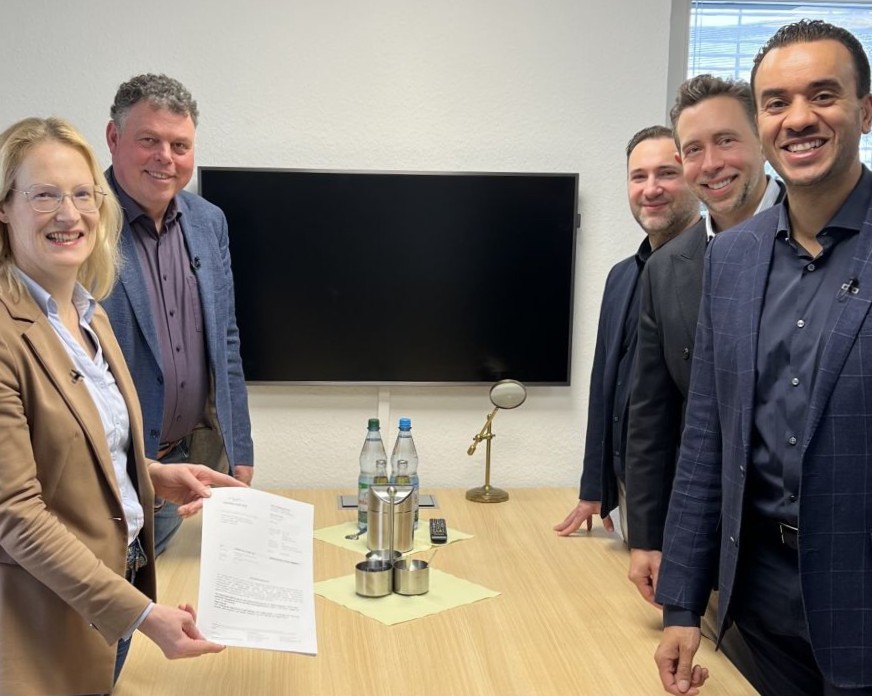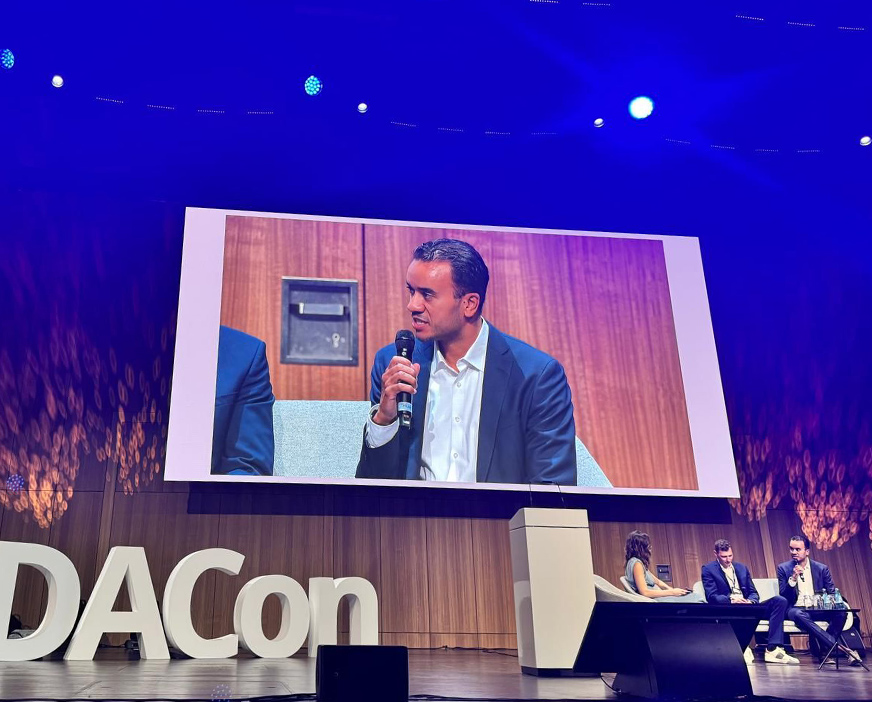The business of subscription-based applications is booming, especially in Germany. According to statistics, the Federal Republic leads the SaaS (Software-as-a-Service) market in Europe, alongside Great Britain and France. A market volume of up to 38.9 billion euros is expected for Germany by 2029*.
Outsourcing servers and IT hardware to an external, professionally operated data center (colocation) is a logical step for many SaaS providers. This approach is not only efficiently scalable but can also be combined with attractive additional services. A specialized colocation provider plays a key role in terms of reliability, performance, and cost control.
Colocation as a Success Factor for SaaS Business Models
Whether a startup or an established software provider: Behind every successful SaaS business model lies a reliable, high-performance, and secure infrastructure. Especially during phases of rapid growth, internal IT quickly reaches its limits, whether in terms of scalability, performance, or costs.
Colocation, i.e., housing one’s own physical or virtual servers in an external data center, represents an attractive alternative here. However, not every colocation data center provider is equally suitable for the requirements of SaaS companies. This article shows what SaaS companies should consider when choosing the right colocation provider.

1. Location & Network Connectivity
A SaaS company opting for colocation should definitely ensure that the data center’s location is near internet exchange points and its key markets. The reason: Exchange points like DE-CIX in Frankfurt am Main allow data to be exchanged directly without detours via third-party providers. In 2023, peak values of over 14 terabits per second were reached there. This not only reduces data traffic costs but also increases control, stability, and reliability.
Generally, the shorter the physical path between servers and users or network nodes, the faster the data transfer. International customers, in particular, place great importance on a globally available infrastructure with low latency.
- Extensive Carrier Selection and Cloud Connectivity
Colocation providers suitable for SaaS companies offer a wide selection of carriers and peering options for direct exchange between networks. Furthermore, they enable private connections to public clouds such as AWS, Azure, or Google Cloud, for example via “Cloud Connect” or “Direct Connect”. These dedicated lines are particularly advantageous for hybrid scenarios. - Local Data Protection Policies
In addition, qualified providers meet data residency requirements and enable SaaS companies to securely comply with local data protection laws when hosting in specific countries.
2. Availability & High Availability
SaaS companies should choose colocation providers that offer Service Level Agreements (SLAs) with a guaranteed availability of at least 99.99%. This is the only way to reliably meet the high demands of modern, digital customers with intensive data traffic.
- Downtime Must Be Kept to a Minimum
An availability of 99.99% corresponds in practice to a maximum downtime of approx. 52 minutes per year. This is indispensable for business-critical applications or continuously available services like 24/7 apps. Furthermore, in regulated industries such as finance or healthcare, such availabilities are often legally mandated. - Redundancy is Mandatory
Such operating times can only be ensured through consistently redundant infrastructures. Basic requirements include dual-redundant power supply, network connectivity, air conditioning, and physical security. Leading colocation providers also offer support for geo-redundancy and active-active architectures across multiple locations. - Automatic Failover Configuration
Should an outage still occur, an automatic failover configuration ensures immediate switching to an alternative, functional system. This keeps the SaaS service available almost without interruption.
3. Performance & Scalability with a Modern Colocation Provider
Colocation providers must meet high requirements for IOPS (Input/Output Operations per Second), network throughput, and low latency, as they form the basis for the performance of business-critical SaaS applications.
- High IOPS Ensure Performance
High IOPS are crucial for applications with numerous fast read and write operations, for example, with databases, real-time analytics, or virtualization solutions. The storage systems used must be able to process many parallel accesses without affecting overall performance. If this is not guaranteed, delays, outages, or, in the worst case, data loss threaten. Risks that no SaaS provider can afford. - Scalability Options are Business-Critical for SaaS Providers
Another crucial criterion when choosing a colocation provider is flexible scalability of the infrastructure. This allows SaaS companies to ensure that they do not encounter bottlenecks with increasing user numbers or new feature rollouts. Colocation providers offer them the necessary flexibility by providing higher capacities with short lead times to handle short-term load peaks without performance loss. - High-Density Racks for More Performance in Limited Space
Providers who utilize high-density racks with appropriately dimensioned power and cooling concepts enable a particularly compact, high-performance infrastructure. Better scaling per area offers a more efficient cost structure with increased computing power.
4. IT Security & Compliance: The Duty of Every Colocation Provider
Depending on their target audience (e.g., SMEs, corporations, or public authorities), SaaS companies must meet a variety of regulatory and industry-specific requirements. These include certifications such as ISO 27001, SOC 2, BSI C5, or ISAE 3402. Especially for customers who need to operate GDPR-compliant, a colocation partner offering hosting in a German or EU data center pays off. They can improve the level of protection through additional services:
- Segmentation and Physical Security
Logical and physical segmentation within the data center allows systems to be separated from each other and potential attack surfaces to be minimized. Biometric access controls, video surveillance, and a 24/7 security service provide additional security. - Multi-Tenancy & Audit Support
A colocation provider must be able to serve multiple customers on the same infrastructure without them affecting each other – neither in terms of performance nor security. This requires a flexible, multi-tenant architecture that dynamically allocates resources such as power, cooling, network, or rack space, strictly separated from each other. True multi-tenancy ensures that a SaaS company’s data and systems are inaccessible to other tenants.
A qualified colocation partner also supports its SaaS customers through audits and certification processes if required. - Zero-Trust Architecture
The Zero Trust model is based on the principle that no user or device is automatically trustworthy – not even within one’s own network. A modern colocation provider supports Zero Trust through features such as strong authentication, granular access rights, network segmentation, and continuous monitoring. For the protection of sensitive data in a shared data center, these measures are an indispensable security factor. Accordingly, they are also an important characteristic of experienced colocation providers.
5. Operational Requirements & Future-Proofing
In addition to technical performance, operational aspects also play a central role, especially with regard to growth, efficiency, and future-proofing.
- Contract Model & Flexibility
Selectable tariffs, short terms, fast upgrades: Those who grow dynamically need a provider that adapts flexibly. Pay-as-you-grow models make growth more predictable and scalable. - Technological Openness
SaaS providers working with GPU servers, AI/ML workloads, or edge computing need a colocation partner who actively supports these technologies, both infrastructurally and operationally. - Interconnection & Ecosystems
Access to cloud marketplaces, partner networks, and carrier services within the data center offers real added value. This enables hybrid architectures without complex external connections. - Customized Solutions
White-label services, managed hosting, or individual network architectures are crucial for many SaaS players. A colocation provider should enable these as modular extensions.
6. Support & Partnership
SaaS companies also benefit from experienced colocation partners when it comes to technical support:
Fast response times and direct contacts are indispensable in this context and are available to the SaaS provider with professional advice on topics such as architecture, security, and migration if required. As part of their service package, they offer SLA-covered Smart Hands services.
7. Sustainability & CSR
A responsible colocation partner thinks beyond technology and considers environmental and sustainability aspects in their strategy. Key levers here include the procurement of electricity from renewable energies, an energy-efficient design with low PUE values, and the climate-neutral operation of the facilities. These factors directly impact the ESG balance sheet of SaaS companies – an increasingly important aspect for investors, customers, and partners.
If a colocation provider explicitly states its CO₂ compensation or energy efficiency, this contributes to the transparency of the entire supply chain.
The Right Colocation Provider as a Strategic Partner for SaaS Companies
A professional colocation provider enables SaaS companies to have a scalable, secure, and economical IT infrastructure with full control. Compared to exclusively using public cloud offerings, providers can better implement individual requirements and realize hybrid models.
An established colocation provider like firstcolo also offers a traffic mix from Tier 1 carriers, its own GDPR-compliant public cloud, and numerous high-quality managed services. This creates real added value and strengthens the competitiveness of SaaS companies in a dynamic, growth-driven market.
* Source: SaaS Statistics 2025








